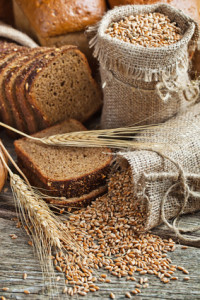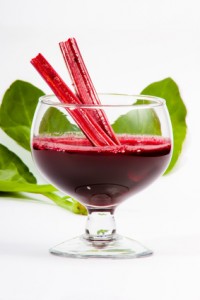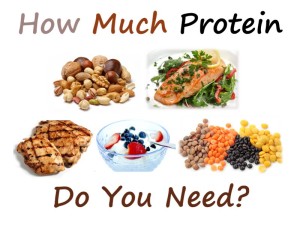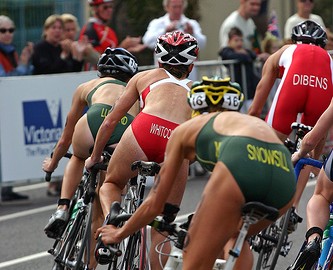I enjoy keeping up-to-date with the latest nutrition, sports science, and disease-prevention research. Remember, although one study can make a dramatic headline, it often takes years of research and different kinds of studies to show how something is affecting our health.
- For a general overview of nutrition for athletic performance that puts the latest research in context, check out this page.
- If you are looking for good sports nutrition resources, check out this page.
Below are links to recent research or well-presented articles that caught my attention. I’ll be updating the list so be sure to check back!
Carbohydrates
 Carbs, not fats, boost half-marathon race performance, study finds.A study in competitive runners confirms that carbohydrates are the body’s preferred source of fuel for endurance events. Study authors conclude that for best race performances, endurance athletes should use dietary strategies that maximize carbohydrate availability before and during competition. (Journal of Applied Physiology, Nov 2015).
Carbs, not fats, boost half-marathon race performance, study finds.A study in competitive runners confirms that carbohydrates are the body’s preferred source of fuel for endurance events. Study authors conclude that for best race performances, endurance athletes should use dietary strategies that maximize carbohydrate availability before and during competition. (Journal of Applied Physiology, Nov 2015).- Higher carbohydrate intake reduces overtraining symptoms (Asker Jeukendrup, mysportscience.com)
- Carbohydrate drinks, gels and bars: Why two carbs are better than one (Peak Performance UK)
- Does Carb Loading Make a Difference? (Matt Fitzgerald); Study-> Metabolic Factors Limiting Performance in Marathon Runners (Plos One, October 2010)
- Myths surrounding pre-exercise carbohydrate feeding (Jeukendrup & Killer, Annals of Nutrition Metabolism, Feb 2011)
- Systematic review: Carbohydrate supplementation on exercise performance or capacity of varying durations (Stellingworth & Cox, Applied Physiology, Nutrition, and Metabolism, 2014, 39(9): 998-1011.)
- A Step Towards Personalized Sports Nutrition: Carbohydrate
Intake During Exercise. (Jeukendrup, A; Sports Med (2014) 44 (Suppl 1):S25–S33) - Exercising in the heat? You may need more carbs (Alex Hutchinson – Runner’s World)
Low Carb Diets for Athletes
Currently there is no good evidence to suggest that low-carb diets improve performance in athletes. Avoiding carbohydrates is more likely to decrease performance.
- Low-carbing for endurance: the oxygen problem (Examine.com)
- Ketogenic diets for athletes (Asker Jeukendrup, mysportscience.com)
- Low-Carbohydrate Diets for Athletes (video – NSCA’s 2013 Personal Trainer Conference, Alan Aragon and Jeff Volek).
- A low-carb diet can hurt your training without you even realizing it. Nice review of Australian study looking at glycogen (Matt Fitzgerald)
- Higher carbohydrate intake reduces overtraining symptoms (Asker Jeukendrup, mysportscience.com)
- Carbs Are Not the Enemy: Oversimplification Is (John Berardi, PhD)
- Why carbohydrates are critical for top performance in athletes (Iñigo San Millán, PhD)
- Carbohydrate needs of athletes (AIS Fact Sheet)
- Are Ketogenic Diets Effective for Athletes? (Jill Parnell, No Baloney)
- Athletes avoiding gluten or grains – is there good evidence? (Sheila Kealey)
- Carbohydrate supplementation during exercise: Does it help? How much is too much? (Asker Jeukendrup, PhD, FACSM)
- The truth about low-carb diets for athletes (Outside Magazine)
- Is there any evidence to support low carb diets for physical performance or weight loss? (Jill Parnell, PhD, No Baloney)
- Carb controversy: why low-carb diets have got it all wrong (Brian St Pierre, Precision Nutrition)
- Athletes Staying Away From Carbs: Really? (Nancy Clarke, RD)
Eating for Performance
Foods That Might Boost Athletic Performance
- A Complete Guide to Proper Marathon Nutrition (Asker Jeukendrup)

- 4 Foods that might boost athletic performance. Some research is suggesting that certain foods could have performance enhancing benefits; the foods include watermelon, beet juice, blackcurrants, and cherry juice. This week, Anita Bean provides a nice overview of the research on these foods. (Anitabean.co.uk)
- Can food make you a better runner? This is an impressive display of information, with food sports nutrition advice. (bbc.co.uk/iwonder)
- Acute dietary nitrate supplementation enhances compensatory vasodilation during hypoxic exercise in older adults (Journal of Applied Physiology, January 2015)
- More evidence shows moderate coffee intake won’t dehydrate you
- Caffeine over consecutive days improves endurance performance (xc ski double-pole) (Medicine & Science in Sports and Exercise, September 2014)
- Dietary Nitrate Supplementation and Exercise Performance
- Will Beet Juice Improve Endurance Performance? (Sheila Kealey)
Pre-Exercise Nutrition
- Pre-Exercise Nutrition: The Role of Macronutrients, Modified Starches and Supplements on Metabolism and Endurance Performance (Ormsbee MJ et al; Nutrients 2014, 6(5), 1782-1808)
- What Should I Eat Before I Workout? (Sheila Kealey)
Protein Intake and Performance
- The New Rules of Protein (Anita Bean)

- Masters endurance athletes may require more post-exercise protein (Int J Sport Nutr Exerc Metab. 2015 Sep 24)
- How Much Protein Do You Need? (Sheila Kealey)
- A Brief Review of Critical Processes in Exercise-Induced Muscular Hypertrophy (Phillips SM, Sports Med (2014) 44 (Suppl 1):S71–S77)
- Is There a Need for Protein Ingestion During Exercise? (Van Loon LJ, Sports Med (2014) 44 (Suppl 1):S105–S111)
- International Society of Sports Nutrition position stand: protein and exercise. (Campbell B., et al; Journal of the International Society of Sports Nutrition 2007, 4:8)
Sports Nutrition to Prevent or Help Heal Injuries
Nutritional Support for Exercise-Induced Injuries. Nice review article summarizing the evidence to date about nutrition for sports injuries. (Kevin Tipton, Sports Medicine, November 2015).
Can what you eat help sports injuries? Muscle and tendon injuries are common in athletes, and new studies are uncovering new rehabilitation and and diet strategies that can help muscle and tendon heal faster. Exercise physiologist Asker Jeukendrup summarizes evidence presented at a recent conference for muscle injury and tendon injury. (Asker Jeukendrup, Mysportscience.com)
Here’s a great video explaining this research and other nutrition strategies for injuries by the folks at Guru Performance.
‘Nutrition strategies for tendon repair’@GuruPerformance InfoVideo:
? Tendons and Performance
? Injury and Recovery
? Nutrition Strategies pic.twitter.com/0DXHkLgxHr— Laurent Bannock (@laurent_bannock) February 19, 2017
Sports Nutrition to Prevent Stress Fractures
Prone to stress fractures? Consider your sports nutrition.
Weight bearing exercise is generally good for bone health, because bone responds to the stress of exercise by becoming stronger. But some athletes are more prone to stress fractures than others, especially athletes who aren’t eating enough for the demands of their sport.
Female athletes who are underweight and amenorrheic often have decreased bone mineral density and are at increased risk for fractures (reduced estrogen limits the amount of calcium absorbed and laid down in bone). Also, late menarche (more common in female athletes) has a negative impact on bone health and increases stress fracture risk.
Although a variety of factors contribute to fractures, recent research suggests that what an athlete eats before, during, and after exercise can influence bone turnover. Making the right choices could potentially offset bone loss and prevent stress fractures.
Carbohydrates during exercise might benefit bones. It is already firmly established that eating carbohydrates helps endurance performance; this week a study published in the Journal of Applied Physiology looked at how carbohydrates (8% glucose solution, similar to most sports drinks) during exercise influence bone metabolism during a strenuous 2-hour treadmill run. Researchers found that compared to placebo, runners who ingested carbohydrates during their run had reduced markers of bone resorption (breakdown). The effect was small and requires further study, but if you’re someone who goes without food/carbs during long workouts (and are prone to stress fractures), it seems this would be an good strategy to adopt, especially since carbohydrates will help other performance measures as well. (Journal of Applied Physiology, October 2015)
Another strategy for bone health is a calcium-rich meal before exercise. Athletes lose calcium through sweat during exercise, which puts them at risk for bone loss, especially if their activity is non impact since it doesn’t benefit bones. A study in female cyclists found that eating a dairy-rich meal 90 minutes before riding can counter bone loss. The pre-ride calcium-rich meal keeps blood calcium levels stable, so your body doesn’t borrow calcium from your bones to replace what’s lost in sweat. (PLOS ONE, May 2015)
Sports Drinks
- Scientists offer sweet solution to marathon fatigue (Am J Physiol Endocrinology and Metabolism)
- Sports Drink Fact Sheet (Sports Dietitians of Australia)
- Optimal Composition of Fluid-Replacement Beverages (Comprehensive Physiology 2014, 4:575–620).
- Sports Nutrition and Carbohydrate Drinks (Peak Performance Online)
Special Diets
- Can Athletes be Vegans? (New York Times, Nov 2014)
- Exploring the Popularity, Experiences and Beliefs Surrounding Gluten-Free Diets in Non-Coeliac Athletes (Int J Sport Nutr Exerc Metab. 2014 Jun 5).
Eating Disorders
- New study helps explain why eating disorders are so difficult to treat. Although many people make poor food choices, anorexia nervosa is a serious illness where maladaptive food choices can lead to starvation. In a new study, researchers from UC San Diego look at the neural mechanisms underlying anorexia nervosa with brain scanning techniques, and show that brain circuits involved in habitual behavior might help explain the destructive choices. When presented with images of food, brain areas of women with anorexia were more involved than in women without anorexia, suggesting that anorexics weren’t weighing the pros and cons of the food, but choosing based on past experience. The findings emphasize the importance of seeking treatment early. (Nature Neuroscience, October 2015).
- Practice guidelines for the treatment of eating disorders (Australian & New Zealand Journal of Psychiatry; 2014, Vol. 48(11) 977–1008)
- Prevention of eating disorders in female athletes
Excellent review stresses better education for athletes, coaches, and health professionals (J Sports Med 2014 5; 105-113). - Intervention shows strategies to prevent eating disorders in young athletes
- Eating Disorders Resource Catalogue
Vitamins and Supplements
SPECIAL ISSUE of International Journal of Sport Nutrition and Exercise Metabolism: International Olympic Committee Dietary Supplements – Expert Group Meeting
(Volume 28, Issue 2, March 2018).
Excellent resource – see link above for several publications; summaries are linked below.
- Summary Statement: International Olympic Committee Expert Group Statement on Dietary Supplements in Athletes
- IOC Consensus Statement: Dietary Supplements and the High-Performance Athlete
Iron & Calcium
- Training at altitude requires adequate iron stores. If you are an athlete with low iron stores, this new study suggests that it’s important for you try to improve your iron status before training at high altitude, and consider iron supplementation when at altitude. The study found that daily iron supplementation while training at altitude can help attenuate a reduction in iron stores. Overall, athletes with low iron stores should take a look at their diet, and consider an iron supplement under the supervision of a physician, especially if training or racing at altitude. (PlosOne, August 2015).
- The Iron Needs of Athletes: Who Needs More, and How to Get it Through Your Diet (Sheila Kealey)
- Eating dairy before training might help cyclists avoid future bone problems. This study found that a calcium-rich breakfast before an intense ride lessened exercise-induced changes in bone that results from calcium lost in sweat. The calcium-rich meal contained 1,350 mg calcium (that’s a lot of calcium – 1 cup of milk has 300 mg/calcium). What did the the cyclists eat? The breakfast consisted of rolled-oats cooked in calcium-fortified milk, yogurt, and additional milk (PLOS One May 13, 2015).
- Diets of elite female athletes lack iron & calcium (especially aesthetic sport athletes)
Antioxidant Supplements
- Ice baths, antioxidant supplements not always the best route to recovery. Alex Hutchinson reports on 2 new studies showing that ice baths and antioxidant supplements blunt positive adaptations to some types of training. (Alex Hutchinson, Globe and Mail).
- Resveratrol antioxidant hinders training benefits (Alex Hutchinson, Canadian Running)
- Polyphenol Supplementation: Benefits for Exercise Performance
or Oxidative Stress? (Myburgh, K; Sports Med (2014) 44 (Suppl 1):S57–S70) - Why Vitamins May Be Bad for Your Workout
- Study suggests high dose of Vitamin C can hurt athletic performance
- Athletes should get nutrients from foods, not supplements: Vit C & E hamper endurance training
- Antioxidants prevent health-promoting effects of physical exercise in humans (Proceedings of the National Academy of Sciences, 2009)
General
- Nutrition for Training and Performance. The November 2014 issue of the Sports Medicine journal is devoted to reviews of nutrition for athletes. This is a great resource by experts in the field (all articles are open access).
- Nutritional Support to Maintain Proper Immune Status during Intense Training
- Exercise, Nutrition and the Brain. (Meeusen, R: Sports Med (2014) 44 (Suppl 1):S47–S56).
- Gastrointestinal Complaints During Exercise: Prevalence, Etiology, and Nutritional Recommendations. (Prado de Oliveira, E et al: Sports Medicine
Online May 2014)
Eating for Recovery/Adaptations to Endurance Exercise
- Refueling for Recovery (Sheila Kealey)
- Nutrition and the Adaptation to Endurance Training. (Baar, K; Sports Med (2014) 44 (Suppl 1):S5–S12)
- Study shows alcohol after exercise hurts protein synthesis and impairs recovery & adaptation (PLOS One, February 2014)
Sport Specific Nutrition Research
Swimming
- Hydration Guide for Swimmers (Swimming Science)
- Nutrition and Aquatic Sport. Open access articles in: Sports Nutrition in Aquatic Sport. Internationals Sports Nutrition and Exercise Metabolism (IJSNEM Volume 24, Issue 4, August 2014)
Sprinting, weightlifting, throwing events, and bodybuilding
- Nutrition guidelines for strength sports: Sprinting, weightlifting,
throwing events, and bodybuilding. (Slater & Phillips, Journal of Sports Sciences, 2011; 29(S1): S67–S77).

____________
Updated April 08, 2018
Share This: